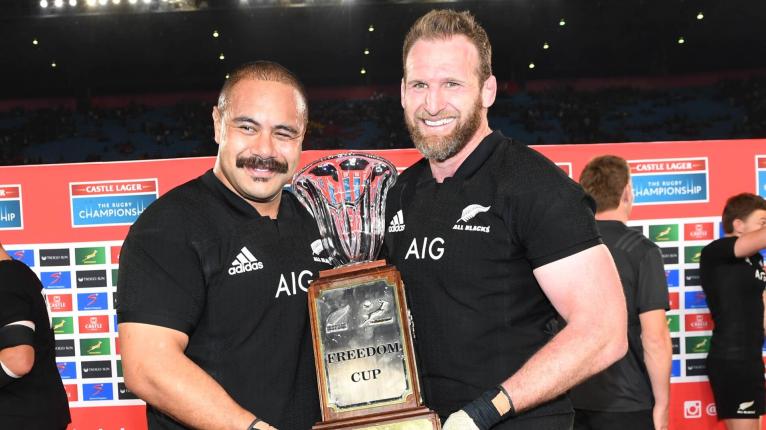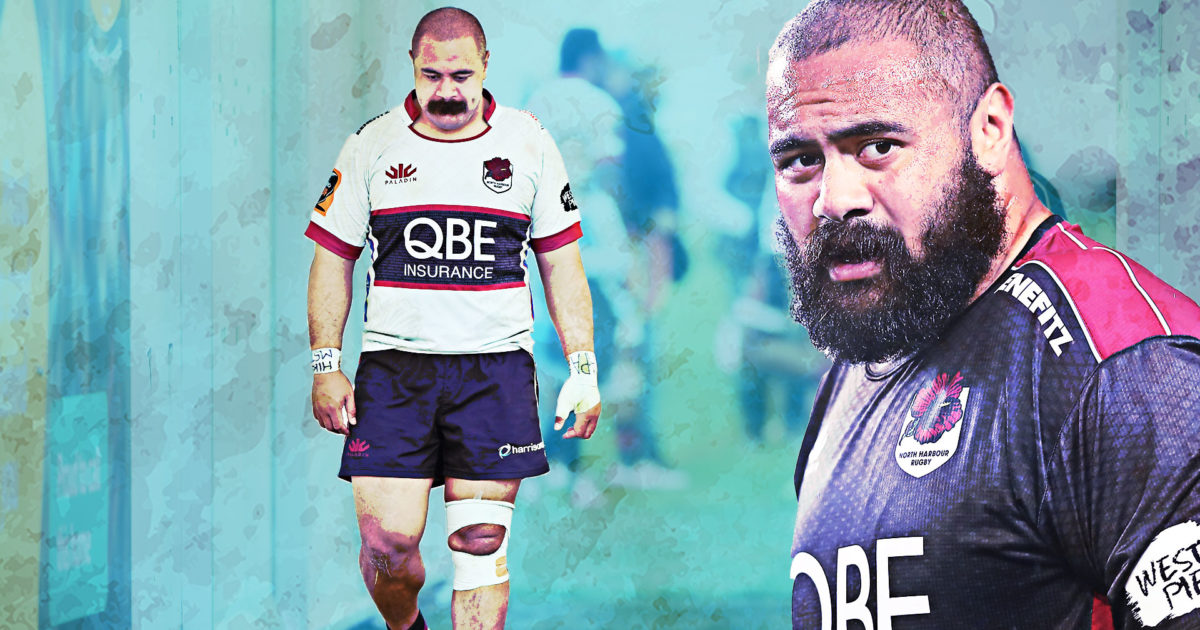Concealed injuries and the luckiest break in the world: The almost unbelievable, untold story of Karl Tu'inukuafe
There are some parts of All Blacks prop Karl Tu’inukuafe’s story that are well documented. Everybody knows the basic tale of the part-time bouncer who was called up to the Chiefs squad in 2018 as an injury replacement and then went on to make the All Blacks that same year.
It’s the classic underdog story – a man who was down on his luck managing to somehow go from amateur rugby player to propping up the scrum of the world’s most successful team, all in the space of a year.
That’s not quite the whole story, however.
In fact, the events leading up to Tu’inukuafe’s call-up to the Chiefs are undoubtedly even more amazing than what happened afterwards – and 2018 wasn’t quite the fairy tale it was made out to be.
Head back to 2010 when Tu’inukuafe was just finishing up high school and rugby wasn’t on the agenda, not as a hobby and certainly not as a career option. “At Wesley College, when I was starting off playing rugby, I’d wake up on Saturday mornings and everyone would be strapping up or getting ready,” Tu’inukuafe told RugbyPass.
“They’d be like, ‘Come on Karl, we got to go’. But I would be in the TV lounge eating cereal and watching cartoons thinking, ‘I don’t want to play today. I just want to relax’. I’ve always been a pretty chilled dude and I wasn’t really interested (in rugby) when I was growing up. I just wanted to play video games; I wasn’t really into getting competitive with sports.”
While Tu’inukuafe’s 130kg weight at Wesley was impressive in itself, he ballooned out to 170kgs within a few years of leaving the school. That’s when the doctors intervened and Tu’inukuafe turned once more to the sport that he had begrudgingly played at college. “Even when I came back to rugby in 2015, it was more just to lose weight and stuff,” he said.
Tu’inukuafe’s brothers were at that stage playing in the Takapuna reserves team and that seemed like a good place to start for the prop – if he had to play rugby, he might as well spend time with his family while he was at it. Unfortunately, the club had other plans for the big man.
“I showed up at the reserves training and the coach came up and told me I wasn’t allowed to play with them,” Tu’inukuafe explained. “I was like, ‘Oh, I’m just here to play with my brothers and stuff’. But he told me, ‘The prems coach wants you in the prems. You can’t play with us.’”
Things really kicked off for Tu’inukuafe when Steve Jackson, the coach of the North Harbour provincial side, spotted the prop’s sizeable body at a Takapuna match. “He saw me playing for Takapuna and he asked if I wanted to be a wider squad member for Harbour.
“I trained the whole year but was basically just there for scrum practice for the boys and I only played at the end of one game. I jumped on the tighthead and we did a scrum and I got penalised because I fell down. We lost by heaps so it wasn’t really my fault that we lost, but it was just funny that my debut was two minutes long and I got penalised straight away.”
Showing up week after week and getting basically no game time would wear down even the most positive person, but Tu’inukuafe’s patience was about to pay off. Ex-Waratah Daniel Halangahu was finishing out his playing career with North Harbour at the time and was contacted by one of his former team-mates, Rocky Elsom.
He was wondering if Harbour had any props that might be interested in playing for French club Narbonne where the ex-Wallaby back row had taken over as president. “Harbour’s props at the time were pretty much Super Rugby props anyway. He [Elsom] basically asked me, ‘Oh Karl, are you Super Rugby?’ I was like, ‘I’m barely a Mitre 10 player.’”
https://www.instagram.com/p/BlR4dRsHlsU/
Tu’inukuafe quickly shut down the move – he didn’t want to leave his wife and young son behind in New Zealand – but Narbonne came back and told the then 23-year-old that he could bring his family with him. “We went to Narbonne within two weeks of him telling me, I just dropped everything.
“It was a huge change for us because we got over there and they were paying us money. They gave us a car and a house, and all the money was pretty much to pocket. It wasn’t that much, but none of it was for rent or gas or driving, it was just basically for food.
“We were eating like kings every day. Burgers, steaks, my wife was baking every day. I wasn’t used to that because I was used to being at home in our one-bedroom flat, eating frozen chicken every week.
“When we got to France, it was a huge culture shock for us seeing how rugby players lived. I wasn’t really a full-time professional (until signing for Narbonne), so going there I was like, “Man, I’m the man. I’m living like a king over here. Is this what being a professional is like?’”
? Angus was pretty good on the sax, but how good is Karl Tu'inukuafe on the piano!?
Watch the full episode of Investec Super Rugby Isolation Nation here ?? https://t.co/c1R753N3zc
?: @SkySportNZ pic.twitter.com/115z1fOpSQ
— Super Rugby NZ (@SuperRugbyNZ) April 13, 2020
It was an incredible year for Tu’inukuafe – off and on the field – and it’s where he honed the craft that he became most known for in New Zealand due to an almost manic focus in France. “Pretty much all we did for the whole year was just scrum, scrum, scrum. The running game for us props when I went to France was almost non-existent.
“We didn’t really carry. We were mostly just hitting the rucks, hitting the mauls, hitting the scrums. It almost changed my whole back because that season. We would have a scrum session twice a day and it was just 45 minutes of non-stop live scrummaging. I used to come home, pour ice on the floor and lie on it because I couldn’t move.
“It was crazy what I went through at that time, but seeing it now it almost conditioned my back for scrummaging long periods of time. Now, even if I’m completely knackered and dead on the field from running, you put me in the scrum, I’m able to do what I did from the first scrum to the last one.
“Before I went to France, I wasn’t really a scrummager. I got picked up for North Harbour because of my running ability. Then I went to France, learned how to scrum, lost my running ability and came back.”
Were it not for the fact that Tu’inukuafe signed a contract to return to Harbour before he departed New Zealand, the newly developed scrummaging king would have almost certainly stayed in France. “I loved the people, the environment, the kind of culture that they had with rugby.
“Narbonne offered to keep me there but I couldn’t accept it until I finished off my Harbour contract. But I wanted to (stay). I told them, ‘When I finish this Harbour contract, I’ll come back and stay with you guys pretty much until I’m retired.’”
The big prop had his sights firmly set on a long-term future in France and had even been approached to represent Tonga – although both those plans were stymied. The ex-Wesley student broke his leg playing for Harbour shortly after he returned to New Zealand in 2016 and his future plans went down the drain.
“Narbonne didn’t want me back because they’re not really into trying to get a guy back into shape after a big injury,” said Tu’inukuafe. “I was about to hang up the boots and I was pretty much done. I thought I’d just work security, that was it for me.”
? Happy birthday to All Blacks prop Karl Tu'inukuafe! Find out more about his meteoric journey from playing rugby to stay fit, to making the All Blacks ?????? pic.twitter.com/KhzxRPg4FS
— All Blacks (@AllBlacks) February 20, 2019
Shortly after, Tom Coventry took over as head coach of North Harbour and despite the broken leg, he signed Karl Tu’inukuafe for the 2017 season. With a bit of help from Harbour physio Matt Wenham, Tu’inukuafe was able to reduce a ten-month recovery by three to four months and the big prop was back on the pitch by the time the Mitre 10 Cup kicked off.
As is well known, Tu’inukuafe missed out on a Super Rugby contract for 2018 but Coventry, who was part of the coaching set-up with the Chiefs for their two titles a few years earlier, put a good word in with new coach Colin Cooper. When injuries struck, Tu’inukuafe found himself running out for the Chiefs.
While Tu’inukuafe was incredibly thankful to Coventry, Cooper and the whole Chiefs set-up, those months playing Super Rugby weren’t exactly stress-free for the big man. Unlike full-time members of the squad, Tu’inukuafe was only getting paid if he was playing.
“I had a lot of small niggles here and there when I was an injury replacement at the Chiefs but I wouldn’t talk about it because I knew if they found out I had a bum ankle, I’d be told to rest it and then I’d probably end up falling out of the picture and not getting paid.

“If I had a sore ankle, I’d just ice it up for one hour or something to make sure I’d be ready to go the next week because I didn’t want to lose the week to week payments. I needed to extend my little contracts every two weeks.
“In the back of my mind, it was all about just trying not to get hurt so I could pay my rent. I was living with my wife and son in a little one-bedroom flat and not doing that well financially. I was just thinking, ‘Oh, I don’t really care what’s happening to my body. I just need to make sure I can keep paying rent, keep feeding the family, whatever.’”
It wasn’t until Aidan Ross was ruled out halfway through the season that Tu’inukuafe was granted a full-time contract and he was able to relocate his family from Auckland to Hamilton, lifting a huge weight off his sizeable shoulders.
Freed of stress, Tu’inukuafe was now able to get through the rest of the season and when injuries struck the national propping stocks, the unknown who had started the year without a Super Rugby contract was elevated into the New Zealand team, making an instant impact by winning a scrum penalty in his first act as an All Black.
It was an almost eerily fitting way for Tu’inukuafe to cap off his year, using the skills he learned in France to completely obliterate the French pack.
Had Steve Jackson not had the foresight to lock the big prop in at Harbour all those years ago before he left for France – and Tu’inukuafe hadn’t broken his leg upon his return – he would probably still be monstering unsuspecting props across Europe and quite possibly representing Tonga.
Instead, the 27-year-old has lived out an absolutely remarkable tale, going from the broken leg that almost stopped him from playing rugby forever to debuting for the All Blacks almost two years later. Now at the Blues, there is still plenty more to come as he enters his prime years as a prop.


















































